The greatest Ironman World Championship athletes of all time
Just who are the best Ironman World Championship triathletes ever? We've argued, debated and discussed the many contenders, and come up with our top 15 greats of all time – but do you agree with our choices?

Boy is this a contentious debate in the 220 office! But after much deliberation, gesticulation and hand-wringing, we managed to whittle our exhaustive list down to the following 15 athletes, made up of, what believe to be, the greatest eight men and seven women who have ever graced the Queen K Highway.
(Note: We’ve focussed on the Ironman World Champs contested in Kona, Hawaii, for this piece as there have only been two Worlds in Nice, France, to date – Sam Laidlow won the men’s in 2023 and Laura Philipp the women’s in 2024. When the 2021 Worlds were moved to St George, Utah, in 2022, we have referenced it.)
15. Chris McCormack
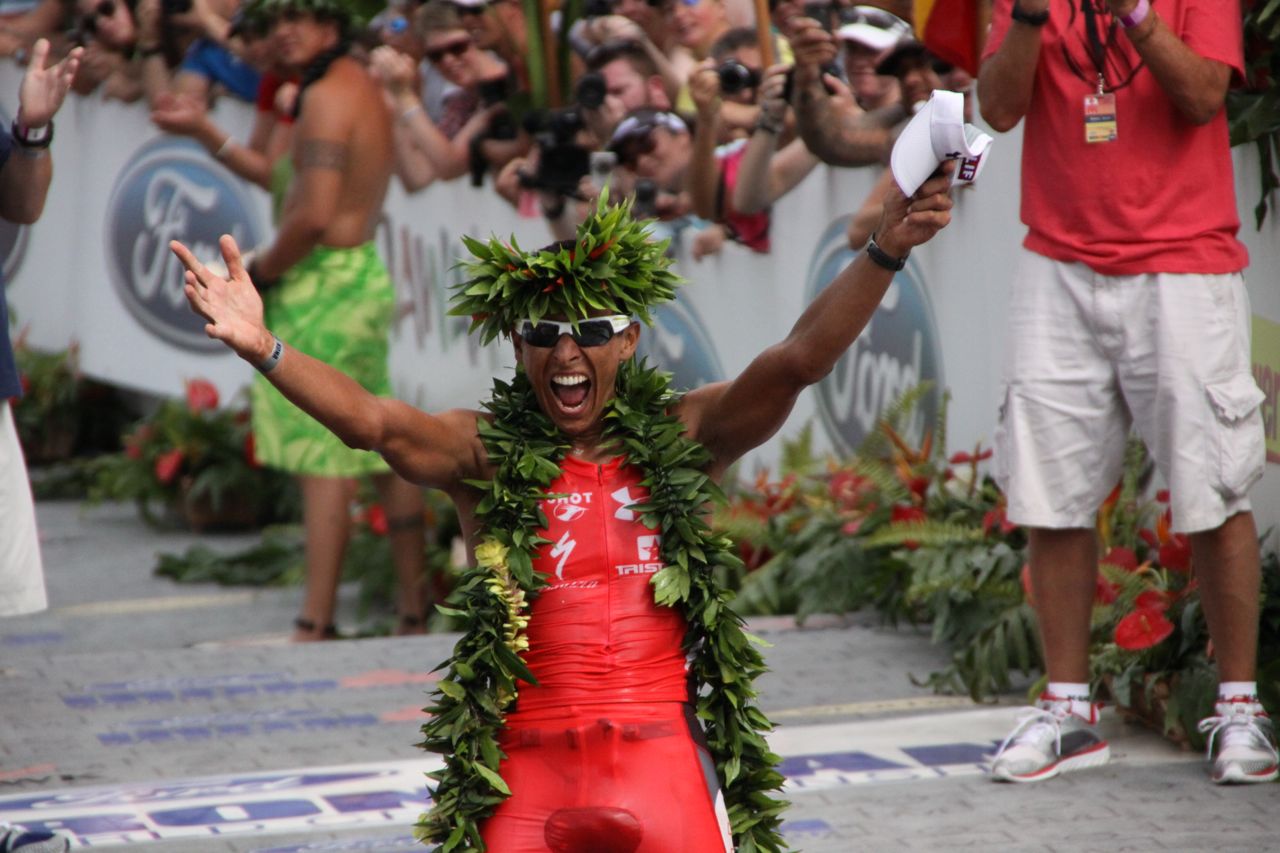
Chris McCormack, known as Macca, is famed as a master tactician, triathlon historian, purveyor of pre-race words of warfare more akin to boxing, and one hell of an athletic performer.
All these traits and more were evident on 9 October 2010, when the Australian multisport legend won his self-proclaimed masterpiece, the Ironman World Championships, his victory over Andreas Raelert being instantly labelled an Iron War for the 21st century.
Everything that has made him a fascinating, fearless and formidable presence on the triathlon circuit for two decades was distilled into that famous victory. But the seeds of success were planted in Hawaii twelve months before, with his disappointing fourth place in the 2009 event.
In his book I’m Here to Win, Macca recalls how he began publicly recruiting strong bikers such as Timo Bracht, Marino Vanhoenacker and Faris Al Sultan to form an alliance with him on the bike leg in a bid to topple the stronger runners – especially Australia’s reigning Ironman world champ Craig Alexander – in the 2010 contest.
What is the greatest Ironman Hawaii race?
The unprecedented plan may have drawn criticism for not being in the spirit of the (individual) sport, yet on that suitably sticky day in Hawaii it came together. After a series of calculated bike surges throughout the 180km course the alliance had dealt with Alexander’s chances of victory, creating for Macca a nine minute advantage out of T2. His chief concern now was the presence of rising German Raelert two minutes behind him.
Raelert caught Macca with 5km of the run to go. After over seven hours and 221km of racing it would come down to a 5,000m duel between the proven winner and the German new kid on the block, four years Macca’s junior. In one of the sport’s most iconic moments Macca turned to Raelert and said, ‘Andreas, best of luck. No matter what happens here, you’re a champion. May the best man win.’
Macca would prove to be the champion, crossing the line in 8:10:37 to win the greatest Ironman Hawaii race of the 21st century.
Who is Chris McCormack?
Born in April 1973, Macca grew up in southern Sydney. Surfing was his first love but it was his early displays of running prowess that got him a scholarship at the University of New South Wales. Macca had been intrigued by triathlon when he annually watched the ABC Wide World of Sports highlights of Ironman Hawaii.
His first triathlon came in 1992, when he showed up at the Wollongong Triathlon and beat the nation’s best junior athletes by virtue of a 31min 10km run split.
McCormack graduated in 1995, moved to France, joined the ITU circuit and rarely looked back, winning his first elite race as a wild-card entry at the 1996 ITU World Cup in Drummondville, Canada. In 1997 he’d become the only man to win the ITU World Cup series and the ITU World Championship title in the same season.
In 2002 he turned his attention to Ironman, winning Ironman Australia on his long-course debut in April 2002: the first of four consecutive victories.
Things at Hawaii weren’t so easy for him. He arrived on a wave of hype (some of it self-generated) in 2002 and failed to finish; he came 59th in 2003 and failed to finish again in 2004.
By chance, the race vehicle that picked Macca up after his 2004 defeat was being driven by one Mark Allen, who suggested to him that he should enter fewer iron-distance races during the season.
After that Macca went on to finish sixth in 2005, then second the following year – behind his new nemesis Normann Stadler (there was evidently no love lost between the two). Finally he captured the Ironman Hawaii title in 2007 after outpacing Craig Alexander on the run.
220 said: A true character of the sport, Macca can be counted on for a ‘candid’ comment on almost any topic. What we like to call ‘an interviewer’s dream’ and a pleasure to observe both on and off the course. Plus, he gave the world Super League Triathlon.
Macca’s Kona Highlights
- 2 x Ironman World Champion – 2007, 2010
14. Jan Frodeno
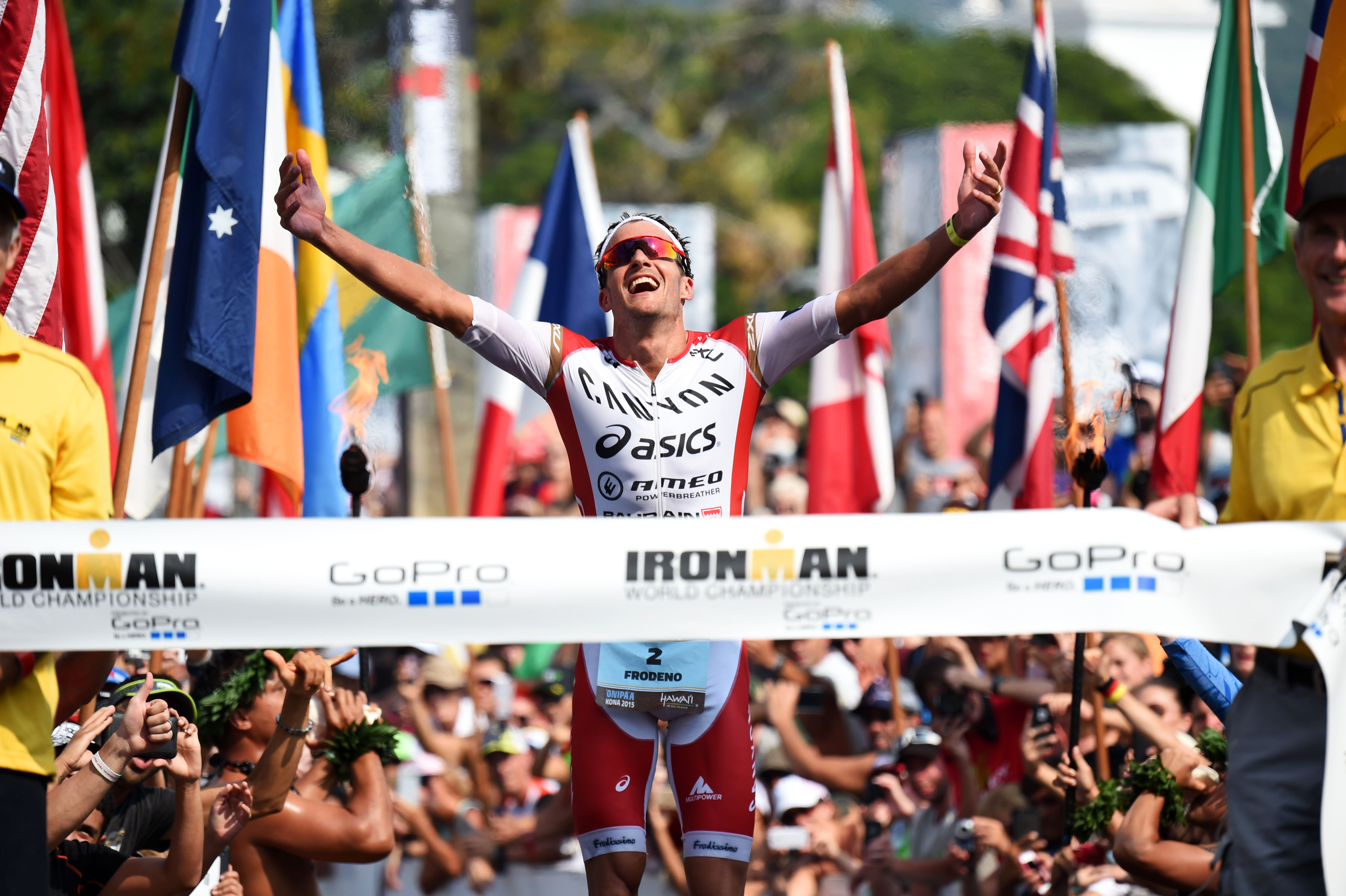
“Who is Jan Frodeno?” asked 220‘s cover in 2008 after a tall, skinny German unknown upset the odds to become the Olympic Games champion a day after his 27th birthday.
It’s a question no one now asks as Frodeno’s place as one of triathlon’s – and Kona’s – greats of all time is assured forever, with three Kona titles, two 70.3 world champs wins and a string of record-breaking performances,.
Back in 2008, in the muggy heat of Beijing the boy from Cologne stayed with the big hitters of the sport on the swim and bike, but faced a trio of more experienced figures in the dying stages of the run.
Standing between the 194cm athlete and gold were Canada’s 2000 Olympic Games Champion and wily operator Simon Whitfield, Spain’s reigning ITU world champ Javier Gómez and formidable Kiwi sprinter Bevan Docherty. Only the brave and the bold would place their bets on Frodeno.
Using his long legs and soon-to-be-famous self-belief, Frodeno pushed past Whitfield with 100m to go and produced the biggest men’s Olympic upset since the young Whitfield had crossed the line eight years earlier.
Watching that race in 2000 had been the spark that launched Frodeno’s triathlon career, and now the man without an ITU victory in his career was the Olympic champion.
Who is Jan Frodeno?
Frodeno, born in 1981, had started his sporting career as a competitive swimmer in South Africa during his teens. After his 2008 Olympic triumph he finished fourth overall in the ITU World Championships in 2009 and 2010, before coming sixth at the 2012 Olympics in London.
By the time he retired from ITU racing in 2013, Frodo had another golden ring and epic journey in his sights: the Ironman World Championships.
He came second at the Ironman 70.3 European Championships in 2013, but Frodeno’s long-course career began in earnest in 2014, with a third-place finish and the day’s fastest marathon of 2:43hr on his Ironman debut at the European Championships in Frankfurt.
The feat was all the more impressive because Frodeno suffered three punctures and lost 10 minutes on the bike leg – but for which he would have leap-frogged the reigning Ironman World Champion Frederik Van Lierde into second place.
Frodeno’s Ironman Hawaii debut in October 2014 also provided plenty of drama and athletic feats: he exited the water in second place, but then a couple of punctures and a time penalty for drafting on the bike leg enabled Sebastian Kienle to increase his advantage over his compatriot.
Frodeno again dug deep into his reserves of self-belief and his ITU speed work to produce the day’s fastest run split of 2:47hrs to finish third behind Kienle and America’s Ben Hoffman.
Mark Allen was just one spectator taken by Frodeno’s racing (“Frodeno had a great race – he looked like he didn’t have a clue what he was doing but he got third place anyway!”).
Has anyone won both Olympic triathlon and Ironman world titles?
2015 would be his year and he would become the first Olympic champion to win the Ironman World Championship title in a time of 8:14:40, 3:03mins ahead of Andreas Raelert, with Tim O’Donnell in third.
In 2016 he successfully defended his title, breaking free from Sebastian Kienle at 15km on the run. Frodeno’s finish was 8:06:30, just short of breaking Craig Alexander’s 8:03:56 course record.
In 2017 injury denied him the chance to try and win a third title. But showing his trademark grit and determination he still finished, even though he had to shuffle much of the marathon.
A withdrawal in 2018 due to a stress fracture only made those Kona fires burn stronger by the time the 2019 race came round… and he came back with a vengeance, breaking the course record in the process.
In 2021 he went even faster at the Battle Royale to clock the then fastest iron-distance time in 7:27:53. [Kristian Blummefelt recorded a 7:21:12 on debut at Ironman Cozumel in November 2021.]
Jan called time on his illustrious career at the 2023 Ironman World Champs in Nice after a string of injuries prevented him from returning to form.
220 said: As a three-time champion, Frodeno has more than earned his place on this list. The patience he displayed in order to reach the pinnacle of long-distance tri is testament to his professionalism and dedication.
Jan Frodeno’s Kona Highlights
- 3 x Ironman World Champion – 2015, 2016, 2019 (a then course record)
- 3rd, Ironman World Championship – 2014 (his debut)
13. Patrick Lange

Born in 1986, Patrick Lange from Bad Wildungen in Germany raced go-karts and mountain bikes as a teenager. In 2004 he started competing in multisport, and then on leaving school spent two-years in the military, representing Germany at triathlon in the Military World Games.
A career as a physiotherapist followed, but triathlon wasn’t forgotten and in the next few years he racked up some impressive results including qualifying for the 70.3 World Champs and a fourth place at Ironman 70.3 Barcelona.
At the end of 2015 he turned pro before coming third in Kona 2016, hinting at what was to come… and it came big style the following year, when he not only won his first world title but also broke the course record with a time of 8:01:40 after storming the marathon leg.
Then in 2018 he flew again, breaking his 2017 record by almost 10mins, finishing in 7:52:39 in what was scarily only his sixth-ever full Ironman race. He also proposed to his girlfriend at the finish line, luckily she said yes.
Six years later – following a DNF due to illness in 2019, a 10th in 2022 and a 2nd in Nice in 2023 – 38-year-old Lange was back on top, matching compatriot Frodeno for a third Ironman title, smashing the Kona record set by Gustav Iden in 2022 with a time of 7:35:53, and breaking the record for the biggest gap between wins.
220 said: Lange achieved a huge amount of success in a short amount of time and yet continues to mix it up at the pointy end as he heads towards his 40s. He’s also proved that you can be a strong endurance athlete while following a vegetarian diet, much like six-time Kona champion Dave Scott.
Patrick Lange’s Kona Highlights
- 3 x Ironman World Champion – 2017, 2018, 2024
- 3rd, Ironman World Championship – 2016
12. Sylviane Puntous
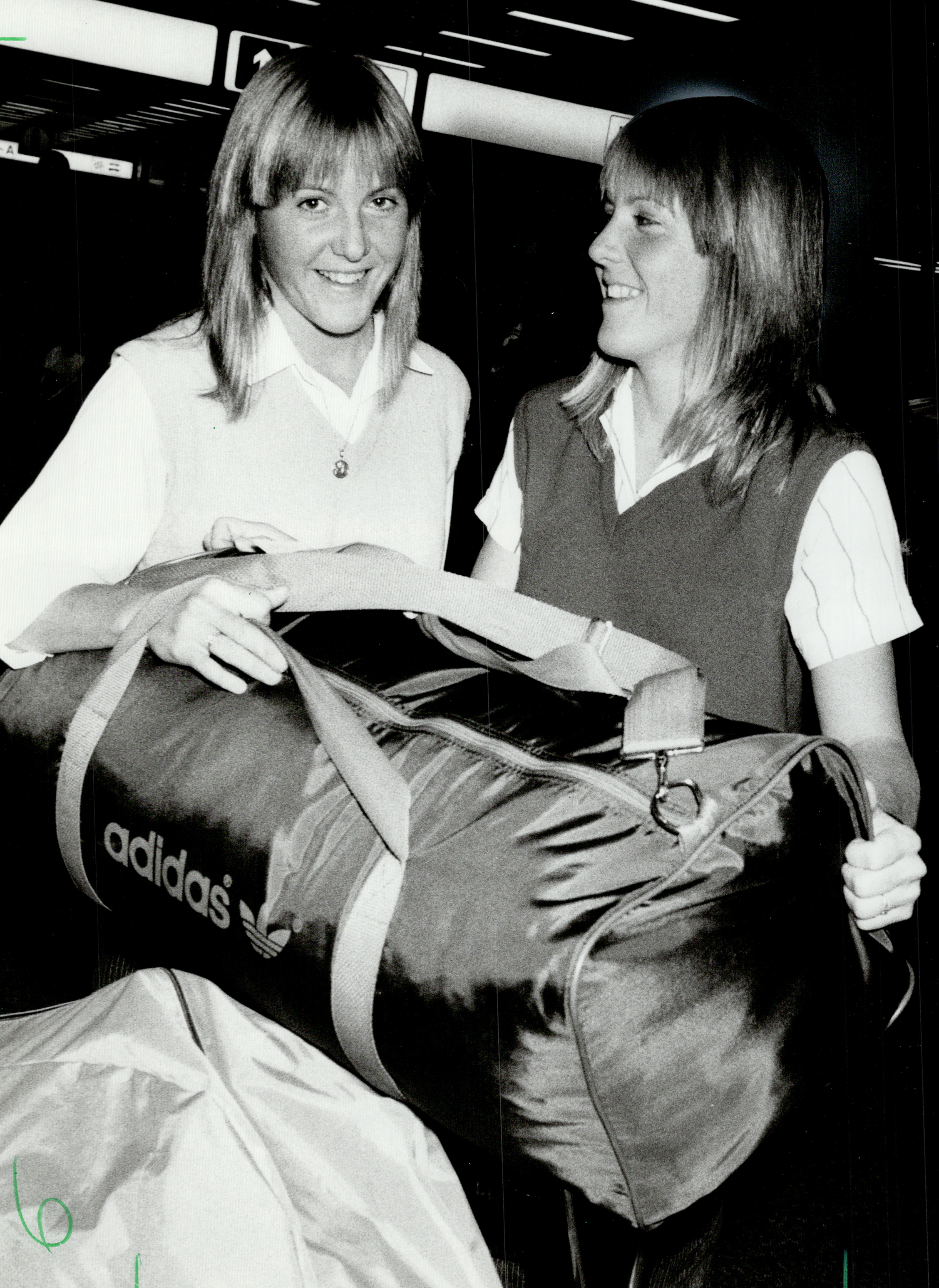
From 1979-82 US female athletes had dominated Ironman Hawaii, occupying every podium place in the first editions of the race. Then, in 1983 and 1984, two identical, inseparable and smiley 23-year-old French Canadian twins showed up and blew away the competition.
On both occasions Sylviane edged her sister Patricia to the title, and in doing so becoming the first non-US winner in Hawaii and the first woman to score back-to-back victories.
Who are the Puntous sisters?
Born in Montreal, the twins were competitive swimmers by the age of eight, before turning to track pursuits in their late teens. In 1981 Patricia developed tendinitis in her heels and was told to cut down on running by her doctor – which led to them racing their first triathlon in Seattle in 1982. In a sign of things to come, they crossed the line together in joint first place.
After their Hawaii successes in 1983 and 1984 (Sylviane first, Patricia second), the twins became triathlon stars, racing around the world and attracting media attention.
After skipping Hawaii in 1985, they returned there in 1986 and it was Patricia’s turn to cross the line first… only to be disqualified for drafting (when it was reportedly Sylviane who was the guilty party).
The win was awarded to Paula Newby-Fraser (with Sylviane second), and television cameras captured the twins crying in each other’s arms at the finish line.
Sylviane finished second again in 1987 and 1989, but the twins would never jointly reach such Hawaii heights again. They finished fifth and sixth at the first ITU World Championships in 1989 before largely disappearing from multisport, occasionally showing up at running or duathlon events near their home of Montreal in subsequent years.
220 said: At a time when Hawaii was dominated by American athletes, Canadian Sylviane Puntous – and her identical twin sister Patricia – showed up in Kona to take the podium prizes back north of the border. Sylviane broke the course record in her first venture in 1983, did it again in 1984 and then pushed legends Paula Newby-Fraser and Erin Baker to their limits in 1986 and 1987 (also finishing second in 1989), respectively. It’s this determination, consistency and trail-blazing that make the inspirational Sylviane edge many superstars – including her sister – into our top 15.
Sylviane Puntous’s Kona Highlights
- 2 x Ironman World Champion – 1983, 1984
- 2nd, Ironman World Championship – 1986, 1987, 1989
11. Scott Tinley
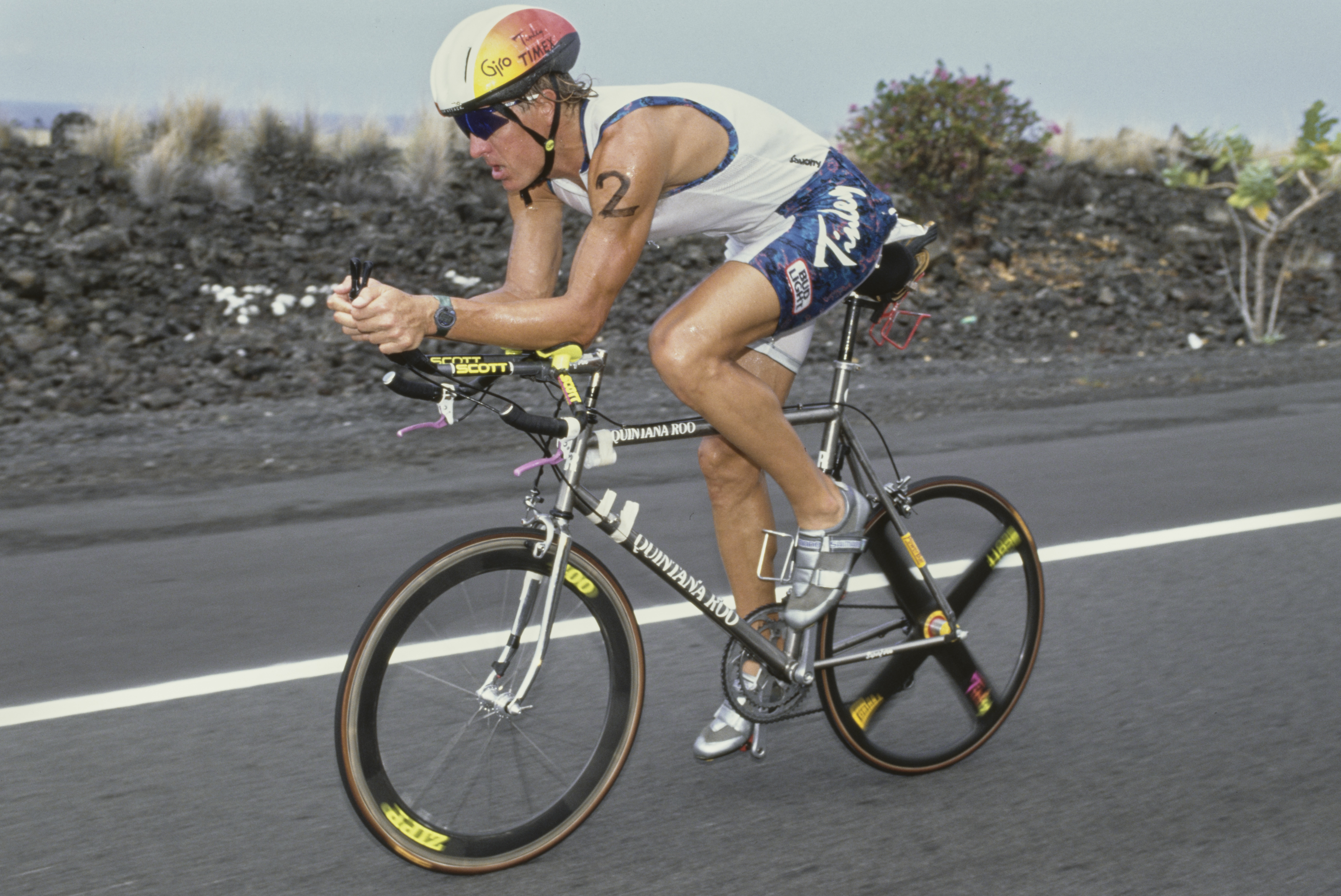
Scott Tinley has been part of modern triathlon since the mid-seventies. He raced his first triathlon in 1976, his debut Ironman Hawaii in 1981 and scored his first win on the Big Island in 1982.
Few, if any, have done more for the sport’s development than the blond-haired, Hamlet-quoting academic. He went on to become reportedly the first man to use aerobars in Hawaii, a Big Four member (alongside Dave Scott, Mark Allen and Scott Molina), and a founder of off-road triathlon.
He’s also been a race organiser, a sports writer (with a long-running column in Triathlete magazine, plus a clutch of novels) and a multisport historian.
Who is Scott Tinley?
Tinley was born in southern California in October 1956, the first of eight children. The beach communities and warm climate of Fullerton were conducive to outdoor activities, and by his teens Tinley was showing promise in both track and cross-country running at St Paul High School in Santa Fe Springs.
His two-decade racing career began in 1976, just two years after the birth of the modern-day version of triathlon in 1974.
The first time he entered Ironman Hawaii was in 1981 on the race’s debut in Kona, and a 10:12hr time secured him third place and the first of eight podiums at the event.
By February 1982 he was on the top step of the podium after cutting an hour off his previous time and emphatically pushing Dave Scott into second. He also posted what was then the fastest marathon seen at the race (3:03hr), while his brother Jeff came third overall.
His feat would’ve had much more attention but for Julie Moss’s finish-line crawl hogging the headlines two hours later.
When Tinley turned pro in 1983 Dave Scott took his revenge (and then some) in the next three editions of Hawaii and left Tinley in second place each time; the margin of victory varied from 20 minutes in October 1982 to just 33 seconds after nine hours and 226km of racing in 1983, the closest race in men’s Hawaii history.
Tinley – now decked-out in aerodynamic booties and an aero helmet and using an innovative wing bar on his track bike – was back on the top step in Hawaii in 1985.
But the field hadn’t included Scott, Allen and Molina, who boycotted that race in protest at the lack of prize money given to the pro field. For all that, far from resenting Tinley for crossing the unofficial picket line, Scott rode in the lead vehicle and encouraged him to break the course record (which Scott himself had set).
Prefiguring his later and hugely successful coaching career, Scott’s selfless gesture pushed Tinley all the way to a record 8:50hr finishing time – maybe the only time a major athlete has willed a rival on to break his own record!
Tinley scored 20 victories out of his 24 races in 1985 at the peak of the Big Four’s dominance. But he openly admitted he was the least talented of the quartet. He told Ironman.com in 2003: “I feel fortunate to have been part of a unique collection of people who dominated the sport.”
And what results they were. Tinley won over 100 of the 400 races he entered during his career and was in the Kona top 10 on a dozen occasions up to 1991.
220 said: The 1982 and 1985 winner, Tinley deserves a spot on this list for being the only athlete who provided some strong competition to challenge the dominance of Dave Scott over the lava fields in the early to mid-80’s. When Mark Allen came along, as well as the 1988 champion Scott Molina, Tinley still stuck around and was more than competitive, placing third in 1990.
Scott Tinley’s Kona Highlights
- 2 x Ironman World Champion – 1982 (Feb), 1985
- 6 podiums, Ironman World Championship – 1981, 1982 (Oct), 1983, 1984, 1986, 1990
10. Erin Baker
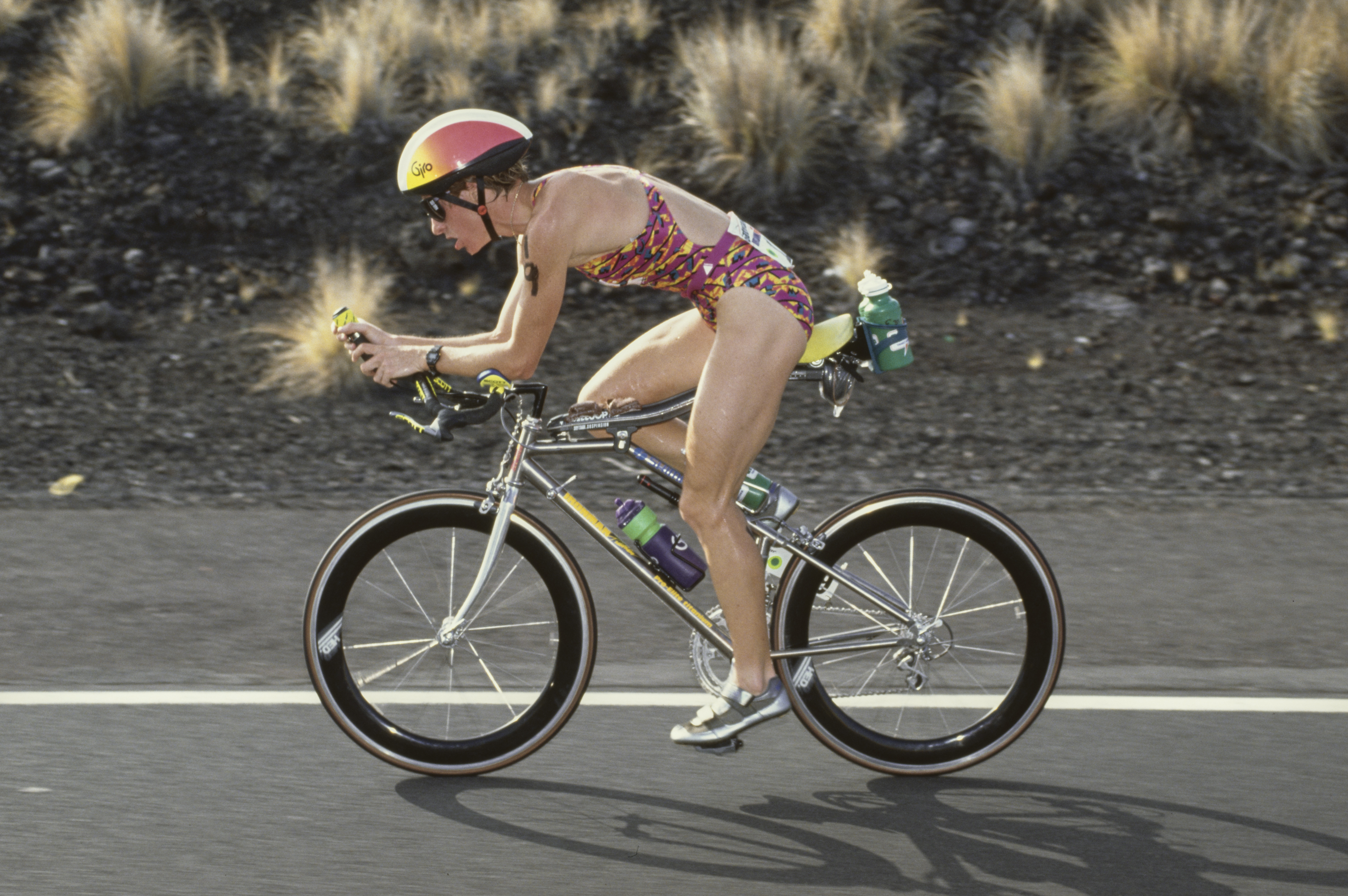
The life of combative and combustible Kiwi athlete Erin Baker has been punctuated by controversy – whether throwing explosive devices during the South African rugby tour of New Zealand in the apartheid days, fighting gender inequality in triathlon or railing at the ‘useless corrupt old men’ at the International Olympic Committee.
Who is Erin Baker?
Erin Margaret Baker was born in 1961 in the small South Island town of Kaiapoi on New Zealand’s eastern coast. From ‘a big, working class family’, she was one of eight children, with her sisters Kathy and Maureen winning national titles in swimming and aerobics respectively and Philippa being a world champion rower.
Baker’s first sporting successes came in cross-country running, and she proved so fast in her debut race that her family missed seeing her cross the finish line by 15 minutes.
Her first brush with infamy came in 1981, when she was convicted of throwing explosive devices while protesting against apartheid during the South African Rugby team tour of New Zealand.
This was to affect her triathlon career because she was banned from entering the United States for some years, and so couldn’t compete in competitions, including Ironman Hawaii.
Baker’s first race and victory came in 1984 in Sydney, where she was working as a radiographer, and a year later she would take the first of her three titles at the Nice International Triathlon. Wins at Ironman New Zealand in 1986 and 1987 followed, and then, after lobbying by the race organisers, Baker’s first venture on the Big Island of Hawaii came in October 1987.
In the tightest battle for podium places that the event had witnessed, Baker fought off previous winners Sylviane Puntous and Paula Newby-Fraser deep into the run, becoming the first athlete from Down Under to win the Hawaii crown and smashing Newby-Fraser’s course record by 14 minutes in the process.
A rejuvenated Newby-Fraser got her revenge in 1988 when she reclaimed her title. Baker’s versatility across all distances propelled her to numerous titles across all levels of the sport and in 1989 she joined Mark Allen as the inaugural winner of the debut ITU World Championships in Avignon, France.
In October 1990 her rivalry with Newby-Fraser was rekindled in Hawaii. This time it was Baker’s day, and she produced a record 3:04hr marathon as athletes dropped like flies in some of the hottest race-day conditions Hawaii has ever witnessed.
The 1990 title was Baker’s last in Hawaii, but she continued to rack up the victories across every level of multisport, winning the ITU World Duathlon Championships in 1991 and Powerman Zofingen in 1992 and 1994 to amass a total of 104 wins in the 121 races she entered.
220 said: Relentless in both her quest for racing victory and political activism, Baker injected a new lease of life into the sport of tri, affecting change that still holds strong today. A true pioneer.
Erin Baker’s Kona Highlights
- 2 x Ironman World Champion – 1987, 1990
- 2nd, Ironman World Championship – 1988, 1991, 1993
9. Peter Reid
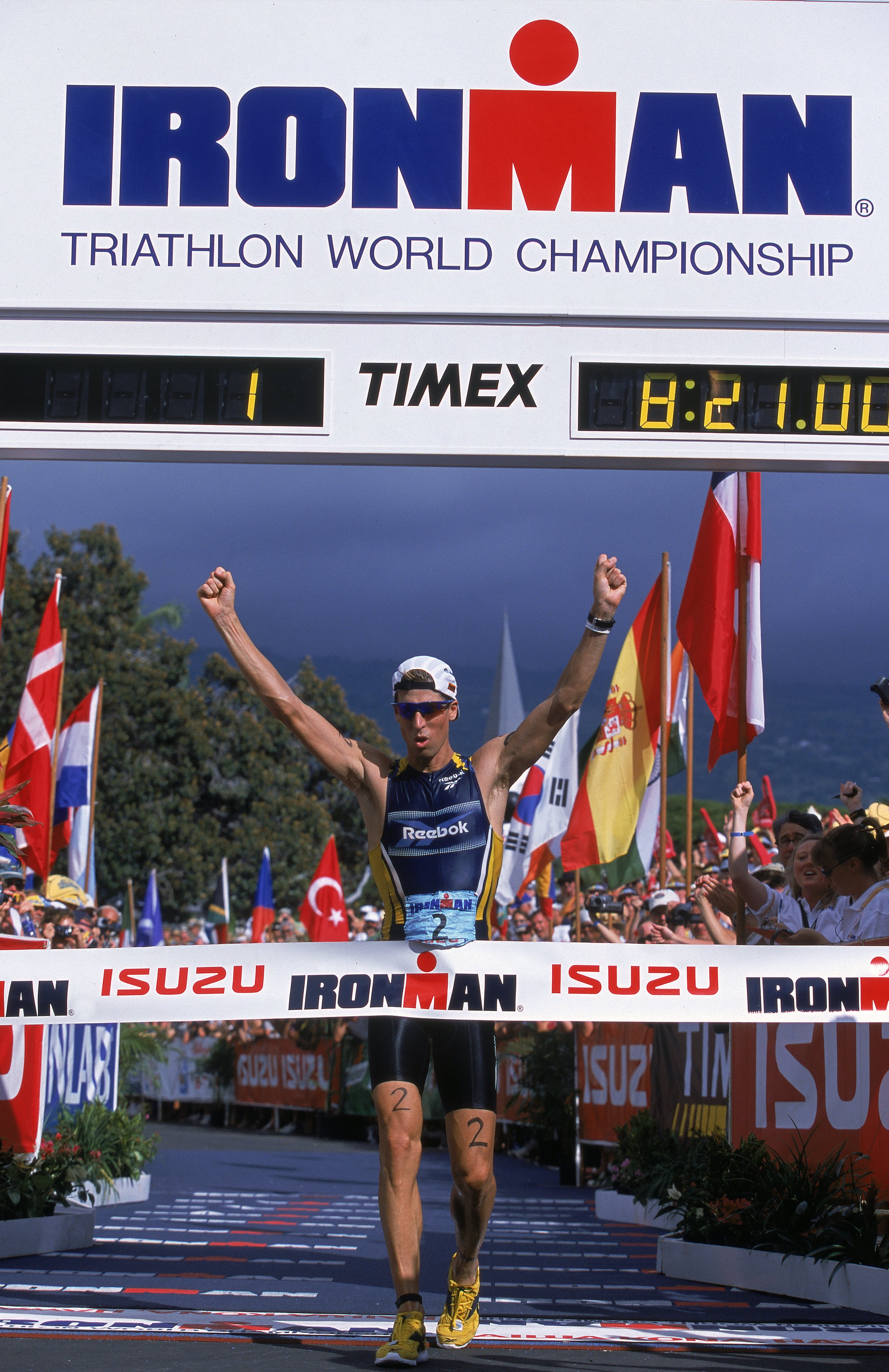
Quebec’s Peter Reid victory at the 2000 Ironman World Championships, the second of his three Kona titles, confirmed his position as one of the most consistently brilliant athletes of his generation, with his 4th, 4th, 1st, 2nd, 1st, 2nd, 1st, 2nd, 3rd finishing run at Hawaii up there with the greatest ever seen on the Big Island.
Who is Peter Reid?
Reid was born in Montreal, Quebec, in May 1969, and throughout his teenage years was heavily into skiing during the harsh winters and cycling during the summer. His first brush with triathlon came in 1989, when its demands forced him to resort to breaststroke just 100m into the swim of his debut sprint-distance race.
Nonetheless, the 20-year-old was soon hooked, even if his parents weren’t convinced. After graduating with a political science degree Reid gave himself a year to show clear signs of improvement in the sport. Giving early indications of his famous perseverance, he soon came good, winning Japan’s gruelling 1993 Astroman duathlon (8.5km run/180km bike/42km run) in a typhoon.
In 1994 he moved west to British Columbia, to train under coach Roch Frey. The results started to flow, with victory at Wildflower and fourth at his first venture in Hawaii – all in 1996, a year when Reid’s education was broadened by weeks spent training with German powerhouse Thomas Hellriegel.
Another fourth place at Kona followed in 1997 before Reid hooked up as a training partner with the rising American star Tim DeBoom in the summer of 1998 in boulder, while staying at Paula Newby-Fraser’s house.
Whatever advice she imparted seemed to work. Just months later in 1999 Reid won his first Ironman world champs victory in 8:24:20hrs after out-biking all the riders bar Hellriegel and outpacing all the runners except Lothar Leder.
Lori Bowden finished second that day in Hawaii, and a year later the roles were reversed when Bowden, now Reid’s wife, took gold, and Reid was second behind Luc Van Lierde.
Reid would label his 2000 Kona victory over DeBoom the hardest race he ever did. In 2002 DeBoom broke free on the run to secure his second Kona title. Reid’s feat in finishing second shouldn’t be underestimated, however. He’d suffered a huge mental and physical burn-out earlier in the year and took a break from the sport on his doctor’s orders.
He swapped his road bike for the motor variety and piled on the pounds. Slowly, he found his motivation and energy returning and set about targeting Kona armed with a beginner’s programme, written by Mark Allen, named ‘18 weeks To Your First Ironman’.
Even so, his preparations for 2003’s Hawaii showdown were far from ideal. His marriage to Bowden had unravelled throughout the year.
“There was no way she was going to win and I wasn’t,” Reid was heard to say in Hawaii. The duo both produced the winning goods on race day (for the last time), and the organisers rearranged the awards ceremony so the two wouldn’t appear together on the podium.
After two more Kona podium places in 2004 and 2005, Reid announced his retirement from triathlon to pursue a career as a bush pilot in the northern wilderness of Canada.
220 said: His triumphs over adversity in Hawaii will remain in Ironman folklore; few have grafted as hard as Peter the Great for victory in Kona.
Peter Reid’s Kona Highlights
- 3 x Ironman World Champion – 1998, 2000, 2003
- 6 podiums, Ironman World Championship – 1999, 2002, 2004, 2005
8. Mirinda Carfrae
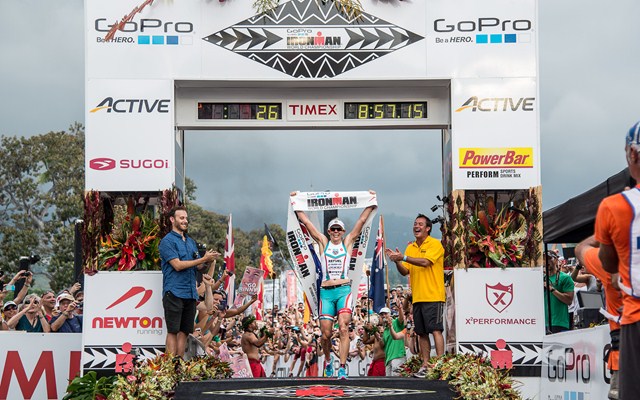
Two hours, 50 minutes and 38 seconds. Mirinda Carfrae’s 42.2km marathon run split at the World Championships in 2013 was a time that sent shockwaves around the Ironman world. This was a faster time than all but two of the men’s and clinched the second of the popular Australian’s three Ironman World titles.
It also meant a new Ironman Hawaii course record of 8:52:14, a record that’d stand until 2016 when Daniela Ryf won in 8:46:46.
Mark Allen said: “Her run split was faster than the men’s winner, Frederik van Lierde, by 40secs. I don’t know anyone who can match that pacing, skill and domination on the run.”
A year later, Carfrae would be at it again, making up a 14min deficit to Switzerland’s Daniela Ryf on the run and breaking her own run course record with a 2:50:26 marathon to win title number three.
“She outran the men’s winner Sebastian Kienle by four minutes. That’s just insane,” continued Allen. “I don’t think Mirinda needs to win six titles to put herself in the same category as Paula Newby-Fraser (eight titles), Natascha Badmann (six titles) and Chrissie Wellington (four titles)… she’s now won three, and the last two have been done in a way that no-one else has ever done before.”
Who is Mirinda Carfrae?
Carfrae was born on 26 March 1981 in Brisbane. Rinny’s first athletic love was playing basketball, before a high school coach noticed her on-court speed and planted the seed of multisport in her mind.
Carfrae’s first tri came at the age of 19, and she was soon picked for Australia’s 2001 junior elite squad.
U23 ITU World Championship silver medals came at Cancun in 2002 (a place ahead of future Olympic champ Nicola Spirig) and Queenstown in 2003, and her ITU career peaked with second place behind Michelle Dillon in a stellar field (including Spirig and Leanda Cave) at Salford’s ITU World Cup in 2004.
By this point Carfrae’s love affair with long-course racing had begun. She came second and set the first of her many run course records at the middle-distance Lake Tinaroo event in 2002.
‘I just remember feeling more comfortable racing the longer distance, and from then I knew I would be racing full Ironman at some point in future,’ said Carfrae retrospectively.
A victory at the Nice Long Course Triathlon in 2004 and a silver medal at the 2005 ITU Long Course World Championship were two early successes for Carfrae. At the Ironman 70.3 World Championships she gained first a bronze in 2006 and then victory in Florida in 2007 (the first of her 20+ Ironman 70.3 career wins).
That win also gave her a qualification spot for the Ironman World Championships in Hawaii. Carfrae raced her first full Ironman at the event in 2009, securing silver behind Chrissie Wellington and posting a course record run of 2:56:51.
Rinny’s 2010 victory came in a field without Wellington, who reclaimed her title in 2011 to leave Carfrae in second place.
After a relatively disappointing third at Hawaii in 2012, the Aussie came back in 2013 with a different coach (a move back to Siri Lindley), and a new bike (the Felt IA) to chop 14mins off her 180km bike leg and break Wellington’s course record by 2mins in an overall time of 8:52:14; a feat that would cement her place as one of the Kona greats of all time.
220 said: Three-time champion Carfrae is most notable for her blisteringly fast run splits and braking Paul Newby-Fraser’s long-standing course record in 2013. Although she never beat her main rival Chrissie Wellington Rinny remains a true Kona great.
Mirinda Carfrae’s Kona Highlights
- 3 x Ironman World Champion – 2010, 2013, 2014
- 4 podiums, Ironman World Championship – 2009, 2011, 2012, 2016
7. Craig Alexander
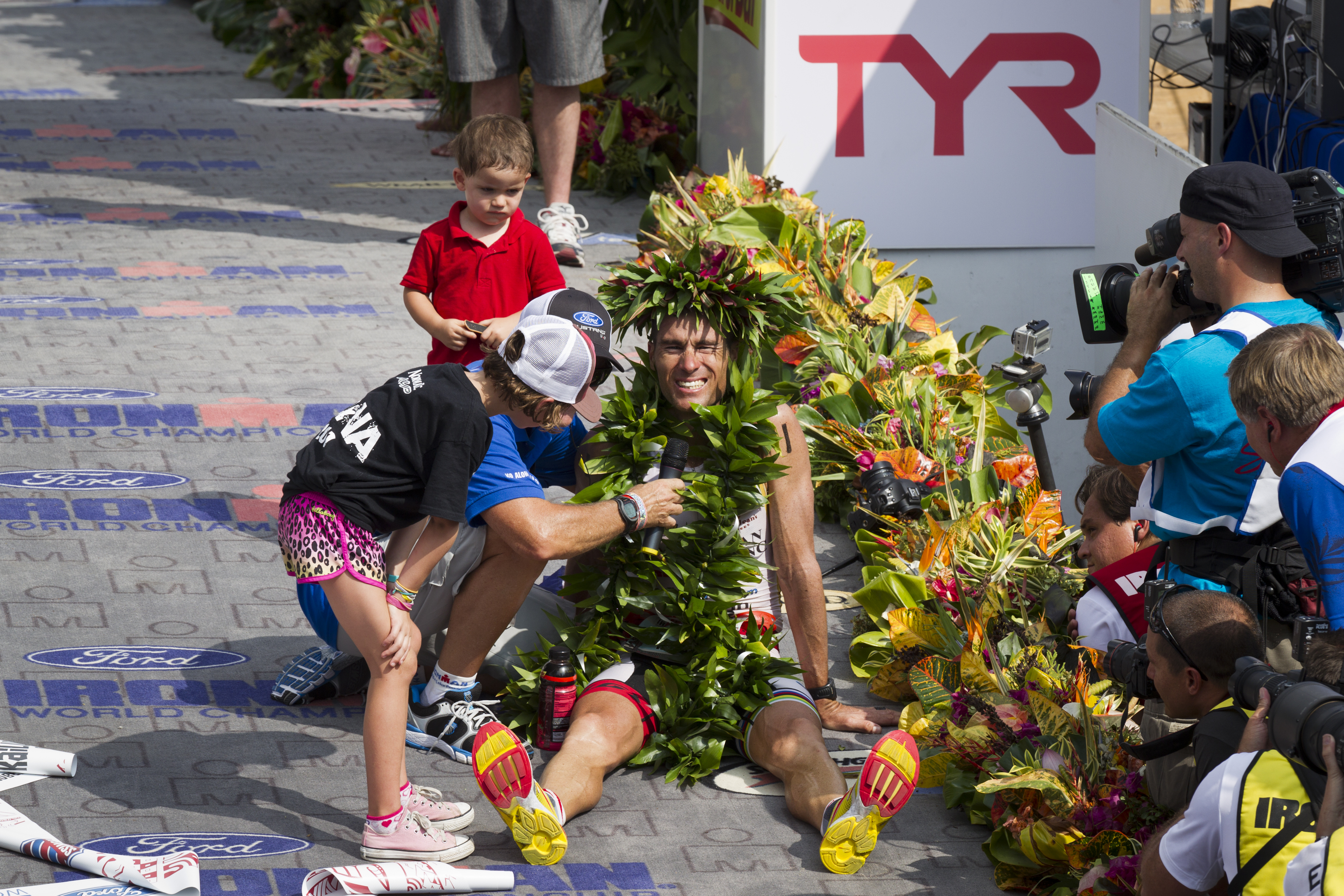
If the 2010 Ironman World Championships were the career high for Chris McCormack, for his compatriot Craig Alexander they marked a rare Hawaiian low. McCormack’s tactical masterstroke saw Alexander suffer on the bike and enter the run stage too far in arrears to win his third consecutive Ironman World Championship crown.
The man known as Crowie would finish in fourth, hurt by McCormack’s alliance and fearing his style of racing had been exposed as one-dimensional.
As one of the most consummate pro athletes ever to grace the sport, Crowie used that stinging defeat to come back stronger.
The 38-year-old ripped up his existing bike contract to join Specialized and sought added advice from Ironman Hawaii legend Dave Scott, especially in strength and conditioning.
Fresh from winning his second Ironman 70.3 world title in September 2011, he returned to Hawaii a stronger all-round athlete in every area.
Eight hours, three minutes and 56 seconds after the starting horn on 8 October 2011 Crowie was leaping across the finish line as the Ironman World Champion once again.
In the process he broke Luc Van Lierde’s 15-year Kona course record, become the oldest ever winner of Hawaii and the first man in history to win Ironman and Ironman 70.3 titles in the same year.
Key to his success was a bike split of 4:04hrs, one of the fastest ever seen in Hawaii and some 15mins faster than his 2010 time. This record would stand until 2017, when German Patrick Lange set a new record of 8:01:40.
Who is Craig Alexander?
Craig Alexander was born in Sydney on 22 June 1973. His early love was soccer, but in 1993 a hernia from his part-time laboring job saw Crowie unable to play soccer for six months, so the then physiotherapy student started jogging to keep in shape.
“This was around the time that Greg Welch, Michellie Jones and the Australians were doing pretty well at the sport. I watched quite a bit on TV and began to read triathlon magazines. I bought a bike from a newspaper called the Trading Post on the Thursday and I did my first triathlon at Kurnell on the Sunday. I loved it, I was hooked,” he says to 220.
He was given a pro licence from Triathlon Australia after impressing at a Powerman duathlon in 1995 and raced his first elite event in October 1995 at the Sydney ITU World Cup. He finished eighth, just a second behind Aussie star Greg Bennett.
Crowie ran his first middle-distance race at the 1997 National Championships soon after, winning it and enjoying the 113km experience.
However, watching the Sydney Olympics in the flesh made Crowie determined to pursue both Commonwealth Games and Olympic places, but a bad case of chickenpox led him to miss qualifying for the 2002 games, speeding his move to long-course racing.
A move to America came in 2002, with a schedule of non-drafting and middle-distance races. “It was the first time I felt like a professional triathlete. I made a lot of friends, trained with Michellie Jones and I never looked back,” adds Crowie.
In 2006 Alexander won his first Ironman world title at the inaugural Ironman 70.3 World Championships in Clearwater, Florida. This was his first of three 70.3 World victories (and one of 26 Ironman 70.3 wins), and it automatically qualified him for the Ironman World Championships in Kailua-Kona, Hawaii in 2007.
He came in second on his debut in 2007, just four minutes behind McCormack. Soon, though, he was the King of Kona, with consecutive victories in 2008 and 2009, both won by outpacing his rivals on the run. Then McCormack out-manoeuvred him in 2010, but Crowie came back with his annus mirabilis in 2011, as we have seen.
He officially retired from Ironman racing in 2014. But that just marked his entry into triathlon coaching, via his business Sansego (= ‘without ego’) – the aptest of names for this truly humble, hugely talented and perennially-popular triathlete.
220 said: You know you’ve reached sporting legend status when you’re known by one name. Crowie had one of the most consistent careers in tri, and continued to mix it at the top despite having officially ‘retired’ in 2014. He’s also one of the nicest chaps at top-level sport.
Craig Alexander’s Kona Highlights
- 3 x Ironman World Champion – 2008, 2009, 2011
- 2nd, Ironman World Championship – 2007
6. Daniela Ryf
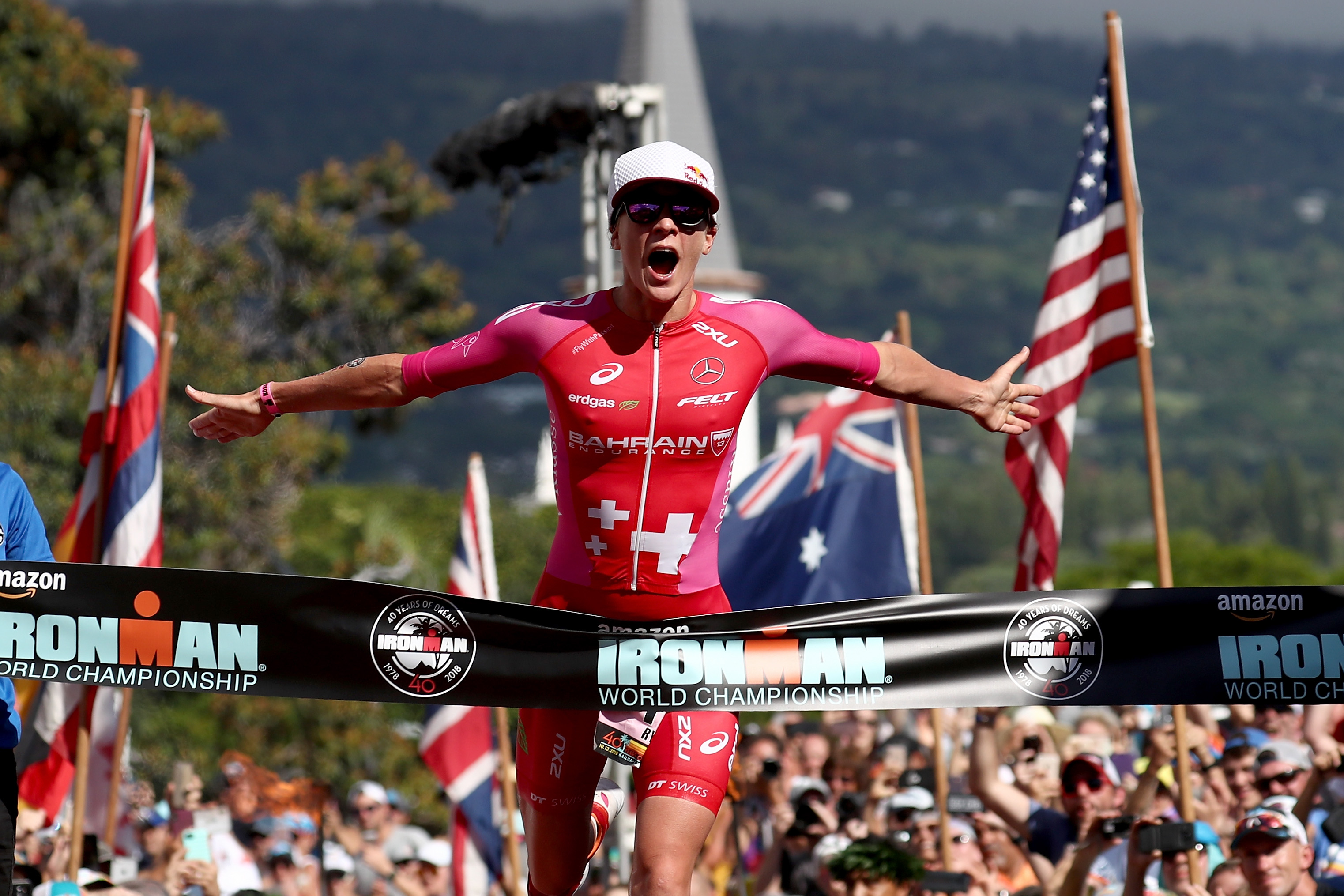
Four-time Ironman world champ Daniela Ryf sits at number 6. Born in 1987, the Swiss star, nicknamed ‘Angry Bird’, started her career in ITU, representing her country at the 2008 and 2012 Olympics before moving to long distance in 2014, under the eyes of revered coach Brett Sutton.
That same year she won the 70.3 World Champs and finished runner up in Kona behind Carfrae before completing the double just one year later in 2015.
Ryf dominated as she has done throughout an unbeaten season to beat Britain’s Rachel Joyce by 13:02mins with Australia’s Liz Blatchford rounding out the podium.
“I think almost everything went perfectly,” Ryf, who like men’s winner Jan Frodeno had also taken the Ironman 70.3 World title in August, said. “In the last 2km I had a flat tyre but could just roll in, so I had some mechanical luck today, too. I have to thank my coach Brett Sutton. Two years ago no one knew me and now he has made me a double- world champion.”
Carrying on her unbeatable form into 2016 she qualified for the Worlds by breaking the course record at Ironman Switzerland just a week after winning Challenge Roth, where she posted the third fastest Iron-distance time ever.
And, once at Hawaii, she defended her crown in dominant style, coming out of T1 in the lead group just five seconds behind leader Meredith Kessler.
Ryf then hit the front 20 miles into the bike leg and stayed there – the only athlete to follow was Anja Beranek (GER) and the two of them continued to build their lead throughout the bike leg.
By the 75 mile mark, she’d made a gap on Beranek and moved 40secs clear. Coming into T2 and Ryf was in her own post code, effortlessly chewing up the tarmac to create a 8mins lead over Beranek before the run. That advantage was 22:15mins over Carfrae, and the title was Ryf’s to lose.
And she continued to fly and broke the the tape in 8:46hr, 5mins faster than Carfrae’s course record.
And in 2017 victory would be hers again in a time of 08:50:47, 4mins shy of last year’s course record. However it wasn’t a win that came easily as GB’s Lucy Charles-Barclay, in her first year as a pro, led from the swim until the latter stages of the bike.
At 100 miles (160km), Charles-Barclay was on her own at the front with Brandon (1:25 behind) and Ryf (3:22) her closest challengers. Yet Ryf powered through the final 20km to pass Charles-Barclay just before T2 to come into T2 after a 4:53:10 bike split.
“It was the hardest I had to ever fight for the win. I’m so happy to turn it around today,” said Ryf at the finish. “I felt really bad at the start of the bike, and I didn’t know what would come. I thought I’d just give my all in the last 40k and didn’t even think about the run.”
In 2018 she would take her fourth title ahead of Charles-Barclay, equalising Chrissie’s record. In 2019, she racked up 70.3 title number 5, but a stomach bug would deny her a sixth Ironman world title as she finished in 13th place.
She was also denied a chance to retain her Kona title in 2020 thanks to the pandemic, but at the postponed 2021 World Champs in St George, Utah, in May 2022, she crosses the line with a 7min cushion over GB’s Kat Matthews, to take her fifth world title, joining an elite club whose only members are her compatriot Natascha Badmann and the Zimbabwean Paula Newby-Fraser.
An eighth place followed in ’22, but things looked a lot more promising in 2023 after she smashes Chrissie Wellington’s 12-year long-course record at Roth by almost 10mins with a time of 8:08:21.
A bout of Covid pre-race, however, sees her on the back foot come Kona in October, managing fifth at the line as Lucy Charles-Barclay takes a well-deserved and hugely overdue victory.
Intending to race the 2024 Ironman Worlds in Nice, France, before bowing out from the sport, the tri world is crestfallen when Ryf announces her immediate retirement due to injury. She will forever remain one of triathlon’s greatest athletes.
220 said: The four Kona and one St. George wins have cemented Ryf’s position as one of the greatest long-course female athletes on the planet.
Daniela Ryf’s Kona Highlights
- 5 x Ironman World Champion – 2015, 2016, 2017, 2018, 2021 (Postponed from 2020 and moved to St. George, Utah, in 2022)
- 2nd, Ironman World Championship – 2014
5. Chrissie Wellington

With four Ironman World Championship wins, Chrissie Wellington has to be listed as one of the Kona greats of all time.
Born in 1977, Chrissie had a sporty childhood in rural Norfolk, swimming for her local club in her teens. After gaining an MA in development studies she worked as a government adviser for international development policy at the age of 25.
A sabbatical followed in 2004, soon after her first triathlon at Dorney Lake (where she finished third). She was hooked and in 2006 she won the Olympic-distance age-group World Championships.
The following year, in August 2007, she turned pro and her coach Brett Sutton sent her off to Korea to compete in her debut Ironman; in a sign of things to come, she won by 50 minutes and beat all but six of the men.
That win enabled her to qualify for Kona in October. Entering as a newbie she went into win the race at her first attempt by a margin of 5mins. This was the start of a string of 13 victories at every iron-distance race she entered.
‘I want to cross the finish line feeling like I’ve given it physically and mentally absolutely everything. This year, I couldn’t have given any more.’ After three wins in a row at the Ironman World Championships in Hawaii (2007–9), that seems a strange thing for British racing great Chrissie Wellington to say, but she had finally got her wish in 2011.
Two weeks before the 2011 race, the 34-year-old was in the ‘best shape of my life’; then a training ride crash left her with a battered body and a torn pectoral muscle. Ten days before the race, her infected leg was twice its normal size.
With five days to go, she had to be lifted weeping out of the pool by her coach Dave Scott and then boyfriend (now husband) Tom Lowe.
It didn’t stop Chrissie and she was four minutes behind reigning Ironman world champ, Mirinda Carfrae after the swim in Kailua Bay. Suffering from hip, back and calf problems, she plugged away on the bike and entered T2 in sixth, three minutes ahead of run course record-holder Carfrae.
Wellington went through the first half marathon in 1:22hrs before Carfrae started chipping away at the deficit. ‘Chrissie’s body was finally starting to shut down. She just had to hang on,’ Dave Scott observed from the side-lines.
Inspired by Rudyard Kipling’s ‘If ’ inscribed on her water bottle, she dug deeper into her mental and physical reserves than ever before. Only at the top of Palani Hill late in the run could Chrissie start to acknowledge her victory.
In spite of the physiological and psychological toil, her 8:55:08 time was only a minute off her own course record. ‘Hopefully this has shown that I’m human,’ she said after reaching the finish and before being hooked up to an IV drip.
That epic encounter was be Wellington’s Ironman finale: her unprecedented 13th victory in thirteen Iron-distance starts. ‘As I crossed the line I felt a weight lift off my shoulders, and not just because I’d won: because I’d defied what I thought I could achieve’, as she wrote in her retirement statement.
220 said: If Chrissie Wellington’s career was relatively short in comparison to fellow Hawaii immortal Paula Newby-Fraser’s, her lasting impact is incalculable. She showed the political passion of Erin Baker when promoting women’s sporting equality and the smiles of Natascha Badmann on the race course, and she proved that the girls could beat the boys at sport with her reliable ability to ‘chick’ all but the very top male athletes.
Chrissie Wellington’s Kona Highlights
- 4 x Ironman World Champion – 2007, 2008, 2009, 2011
4. Natascha Badmann
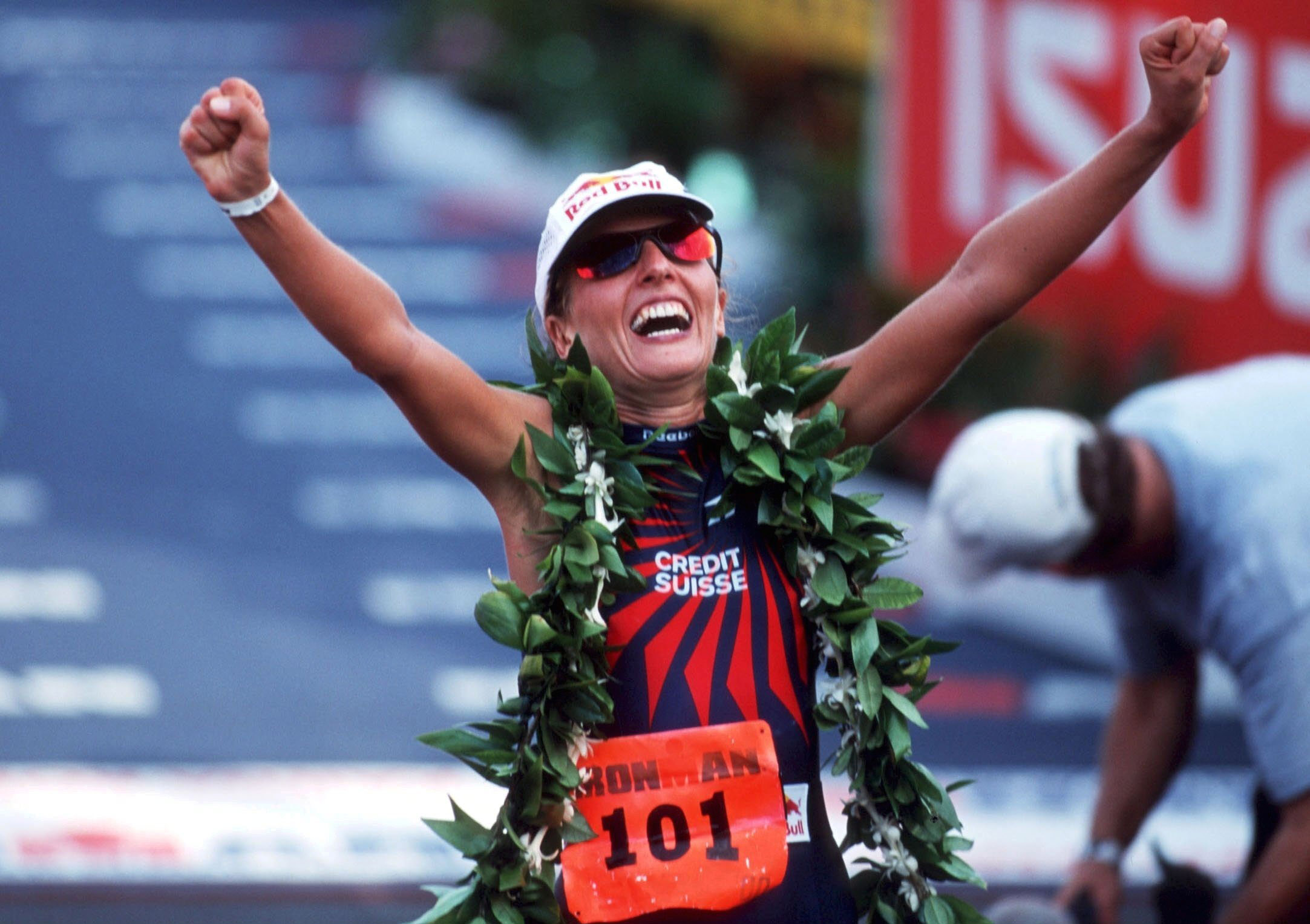
Natascha Badmann’s career résumé includes equalling Dave Scott/Mark Allen’s six Ironman World titles and multiple world duathlon championships. But it is also full of drama, from one of Kona’s most heartbreaking bike crashes to being a victim of Ironman Hawaii’s biggest doping scandal.
Who is Natascha Badmann?
Born in Basel, Switzerland, in 1966, Badmann was far from being a sporting child prodigy and took an unconventional route to the top of the triathlon tree.
She was 17 in 1984 when her daughter Anastasia was born, and in her early twenties she was an “overweight, smoking secretary” when co-worker Toni Hasler entered, and subsequently changed her life forever.
Hasler became Badmann’s partner, coach and nutritionist, and her multisport career began in 1989 with a sixth-place finish at the inaugural Powerman Duathlon Championships.
She entered a number of Olympic-distance ITU races in the early 90s, leading to silver at the ETU European Championships in 1995 and a sixth-place finish at that year’s ITU World Championships (won by the similarly tough-as-nails Karen Smyers).
In October 1996 she first raced Kona, clocking a sub-5hr bike split to finish an impressive second behind Paula Newby-Fraser, who won her eighth and final victory.
Producing her best Kona swim of 56 minutes and the day’s fastest bike split, Badmann held off Lori Bowden on the run in 1998 to become the first European woman to win in Hawaii.
She missed Hawaii in 1999, but returned to Kona in 2000 to win another duel with Canada’s reigning champ Lori Bowden. Bowden broke Badmann’s winning streak in 2003 before the Swiss Miss took another title incontroversial circumstances in 2004.
On that occasion Germany’s Nina Kraft was the first across the Hawaii finish line, with a 17min victory over Badmann; a month later, though, Kraft was found guilty of EPO use.
The 2004 Hawaii title would now be Badmann’s, but the victory left a bitter taste. ‘The most hurting was not getting flowers. Some people say, ‘C’mon, she got her pay cheque.’ That’s not what I race for. Coming down Ali’i Drive, this is the pay cheque.’
Badmann and the ITU-conquering Michellie Jones produced a Kona classic in 2005, with Badmann unleashing her finest run on the Big Island to pass Jones at mile 18.
Stomach issues led to a 10th at Hawaii in 2006, yet Badmann still went into the 2007 edition as one of the pre-race favourites after breaking her course record at Ironman South Africa by 20 minutes. As was customary, Badmann was travelling through the field at 60km/h nearly 20km into the bike leg, when she hit a traffic cone on the Queen K.
The crash left her famous Cheetah time-trial bike shattered, and Badmann nursing a broken rib, torn shoulder tendons and multiple bruises and abrasions. Undeterred, she mounted a replacement bike, cycling for another 50km before Hasler convinced her to stop.
As a result of the crash Badmann underwent numerous operations and extensive rehab, and there was speculation that she’d hang up the tri-suit for good.
Eighteen months later, she was back, pacing down the Ironman 70.3 New Orleans finishing chute to claim a course record.
In 2012, at the age of 45, she won Ironman South Africa, the oldest female winner of an Ironman, and followed that with sixth place in Hawaii. In 2016, she completed her final Hawaii race with a 10:20hr finish at the age of 50.
Mirinda Carfrae said: “Natascha Badmann is my hero. When I first came to race in the US I raced her twice at Eagleman and Buffalo Springs. Both races she was smiling all day long and just killing it! She had to be 40 then, and I was in my mid-twenties. She’s just an impressive human being and has so much positive energy. I just love her!”
Natascha Badmann’s Kona Highlights
- 6 x Ironman World Champion – 1998, 2000, 2001, 2002, 2004, 2005
- 2nd, Ironman World Championship – 1996, 2003
3. Mark Allen
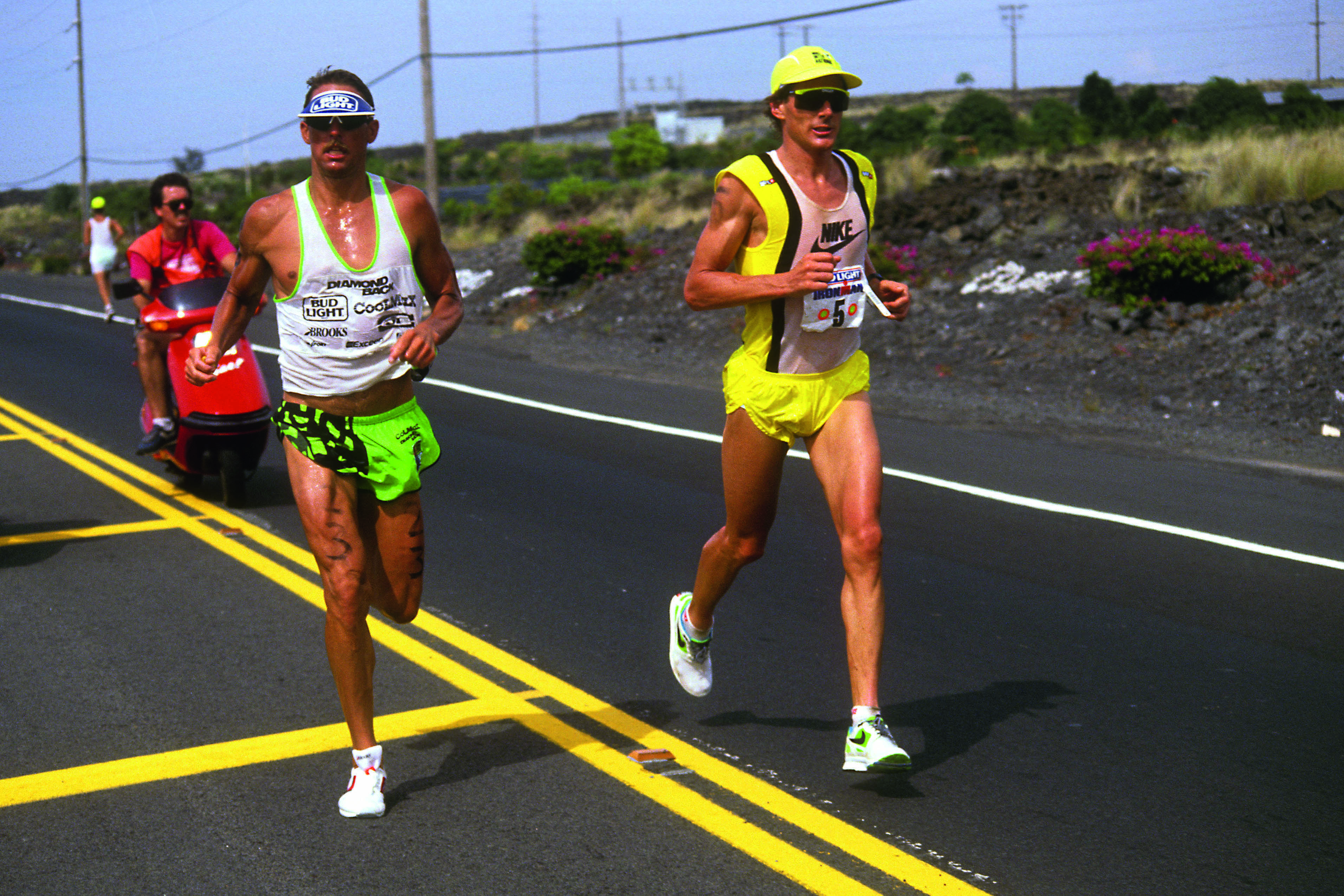
1989 witnessed (see image above) the greatest race in not only Kona’s history but the history of triathlon. Mark Allen, the Californian who earlier that year had won the inaugural ITU World title, finally escaped the immense shadow of Dave Scott to break his Ironman World Championship hoodoo at his seventh attempt.
Born on 12 January 1958 in Glendale, California, Allen showed glimpses of athletic promise in the pool and on the running trails in his youth, but it wasn’t until he witnessed a 90-minute ABC highlights package of Ironman Hawaii that the triathlon bug bit hard.
It was February 1982 and the year when the leading woman – college student Julie Moss – collapsed 400m from glory and proceeded in a famous crawl to the finish line, being passed by Kathleen McCartney on the way. The event brought tears to Allen’s eyes back in San Diego, and he signed up for the next edition of the race in October 1982.
Allen failed to finish that first venture on the lava fields of Hawaii, but later in the year he took the first of his 10 victories at the Nice Triathlon in France.
The Californian star began to make inroads in Hawaii, finishing fifth in 1984 and taking second in 1986. The winner each time? Fellow Californian Dave Scott.
Which male athlete has won the most Ironman world titles?
The rivalry came to a head in 1987 with some pre-race sparring in the media that continued throughout the race, with Allen tapping Scott’s heels on the swim. After 26km of the marathon, Allen had created a 4:30min lead before hitting the wall, succumbing to walking pace by kilometre 35, when Scott passed him on the other side of a TV truck.
Allen finished second and would require medical treatment post-race after internally bleeding during the run. The 1988 Kona was one to forget for Allen (two punctures) and Scott (knee injury), with final Big Four member Scott Molina taking the title. The stage was set for a titanic battle in 1989.
What is the ‘Iron War’?
The 13th edition of Ironman Hawaii took place on 14 October, and, as in 1987, the pair were pretty much inseparable for the duration. As a man who trusts the intangibles more than most, Allen cites an unusual source of inspiration behind his late victory.
“At the half marathon point, I was ready to just give up. I’d been there six times before and never won, and now it was looking like Dave would continue his string of victories. But then I recalled the image of a 110-year-old Huichol Indian shaman, Don José Matsuwa. He had a peaceful but powerful look that said, ‘I’m happy just to be alive.’
“And suddenly, I was just happy to be racing side-by-side with the best guy in the world!” At kilometre 37 of the run, Allen made his move to produce a 2:40hr marathon to smash Scott’s Kona record by 20mins.
Competitor magazine’s Bob Babbitt soon christened the race Iron War; entire books were devoted to the showdown and the duo are routinely being asked about it over 25 years later.
Allen would go on to match Scott’s record of six Ironman World Championship titles, establishing another Kona record with his 8:07hr finish time in 1993 and taking his final Hawaii title in 1995 in another epic showdown, this time with the German Thomas Hellriegel.
220 said: Since hanging up the two-piece suit, Allen has moved into coaching, public speaking and is a globetrotting fitness consultant. Like Scott, he’s always generous with his time and remains a passionate advocate for the sport of triathlon. And like Scott, he’ll forever be a six-time men’s Ironman World Champion. A feat we doubt will ever be bettered.
Mark Allen’s Kona Highlights
- 6 x Ironman World Champion – 1989, 1990, 1991, 1992, 1993, 1995
- 2nd, Ironman World Championships – 1986, 1987
2. Paula Newby-Fraser
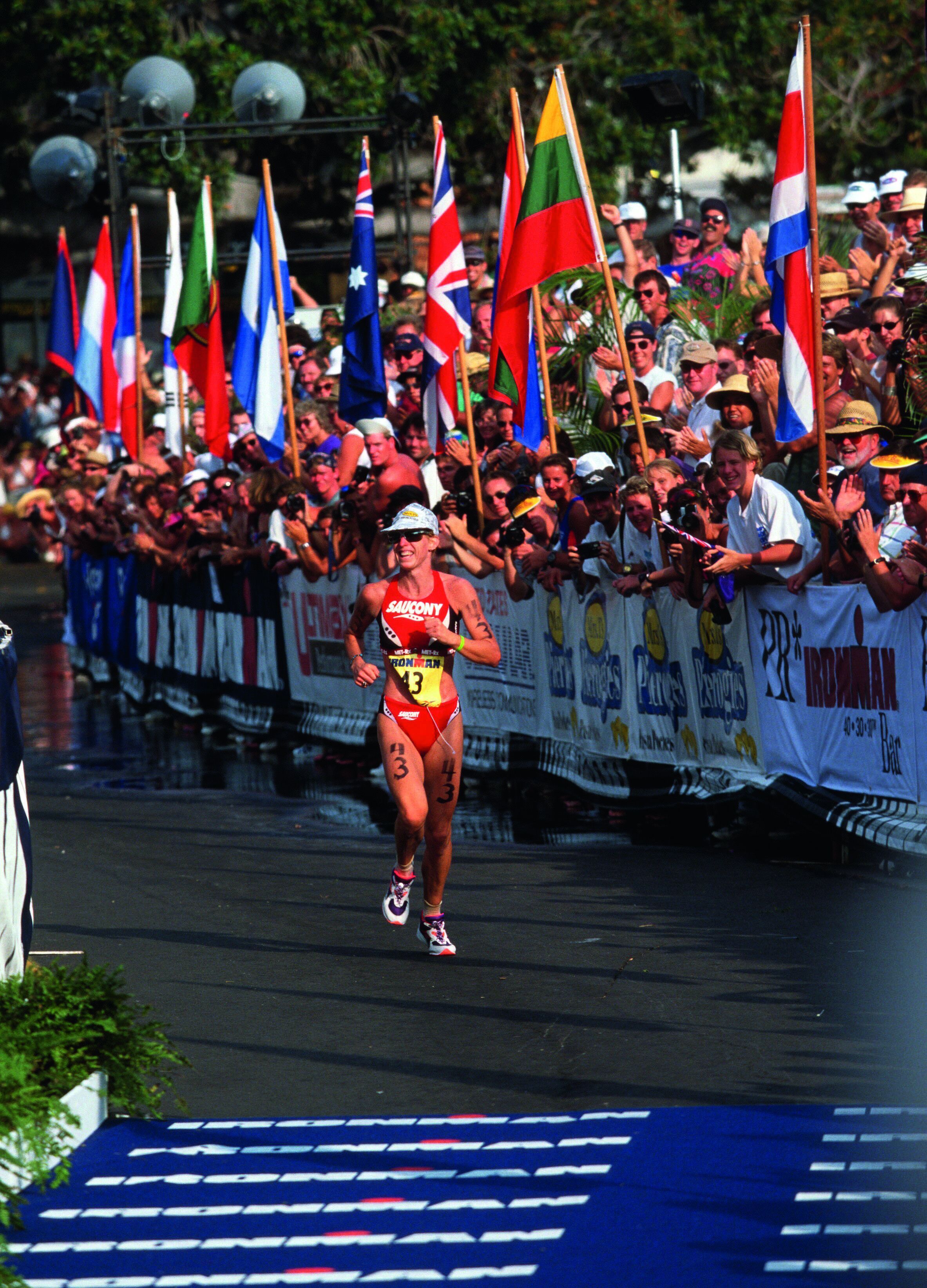
Eight Hawaii titles and the first woman to break nine hours in Kona, Paula Newby-Fraser’s achievements have ensured her of a place in the Ironman World championships history books forever. From beginnings in Southern Rhodesia to the lava fields of Hawaii, her career is one of the greatest-ever witnessed in triathlon
Born on 2 June 1962 in the African country of Southern Rhodesia (now Zimbabwe), she moved to apartheid-era South Africa when she was four. Educated at a strict all-girls’ school, she found her refuge in sport, showing promise as both a nationally ranked swimmer and a classical ballerina in her childhood years.
In 1984, intrigued by a local triathlon, Newby-Fraser bought a bike and, eight weeks later, won the women’s event, breaking the women’s course record and coming fourth overall in the process. Later that season she won the women’s division of the South African Triathlon.
The prize? An expenses-paid trip to the USA to compete in Ironman Hawaii, her journey to the pinnacle of the sport had begun.
Despite having never swum 3.8km, cycled180km or run a marathon, Newby-Fraser scooped third place on her first experience at Kona in 1985, finishing just 5 minutes behind Joanne Ernst.
Inspired Newby-Fraser swapped Durban on the Indian Ocean for America’s in San Diego, the epicentre of triathlon at the time. It paid off and in 1986 she became the first woman to complete Ironman Hawaii in under 10 hours.
Which female athlete has won the most Ironman world titles?
Hawaii 1987 would be Newby-Fraser’s first Kona duel with Erin Baker, the rebellious and combative Kiwi athlete. In the hot 1987 showdown, Newby-Fraser broke her own course record by 9mins but still trailed in third, with Sylviane Puntous taking second, and Baker clocking a 3:11hr marathon split to break the tape in 9:35:25.
The result led Newby-Fraser to devote even more attention to the sport, and in 1988 she finished 11th overall and won the women’s race, blitzing Baker by over 11mins and smashing the women’s course record by 25mins in 9:01:01.
In 1989 she went a minute better than in 1988, with a 21min victory over Sylviane Puntous. In 1990 Baker topped the podium once more, but Newby-Fraser struck back again and won the next four consecutive Ironman World Championship titles.
Erin Baker were absent in 1992, and Newby-Fraser took control and won her fifth Ironman Hawaii title, and became the first woman to break the 9hr barrier at Kona. Her 8:55:28 time remained the Kona record for 17 years until Chrissie Wellington’s similarly dominant 2009 performance.
Newby-Fraser’s unbeaten stretch would end in the most dramatic fashion in 1995 with a fourth place finish. She went into T2 with a 7-minute lead over the USA’s Karen Smyers.
With 300 yards to go she entered Ali’i Drive to the sound of the PA declaring her the victor, but they were to early as dehydration kicked in, and she famously hit the wall, leaving Smyers to take the Hawaii crown.
220 said: In 1996 Newby-Fraser bounced back again to beat Natascha Badmann by 5mins and secure her eighth Hawaii crown, a record that still stands today and quite possibly will do so for eternity. She fully deserves second place in our all-time greats.
Paula Newby-Fraser’s Kona Highlights
- 8 x Ironman World Champion – 1986, 1988, 1989, 1991, 1992, 1993, 1994, 1996
- 3 podiums, Ironman World Championship – 1985, 1987, 1990
1. Dave Scott
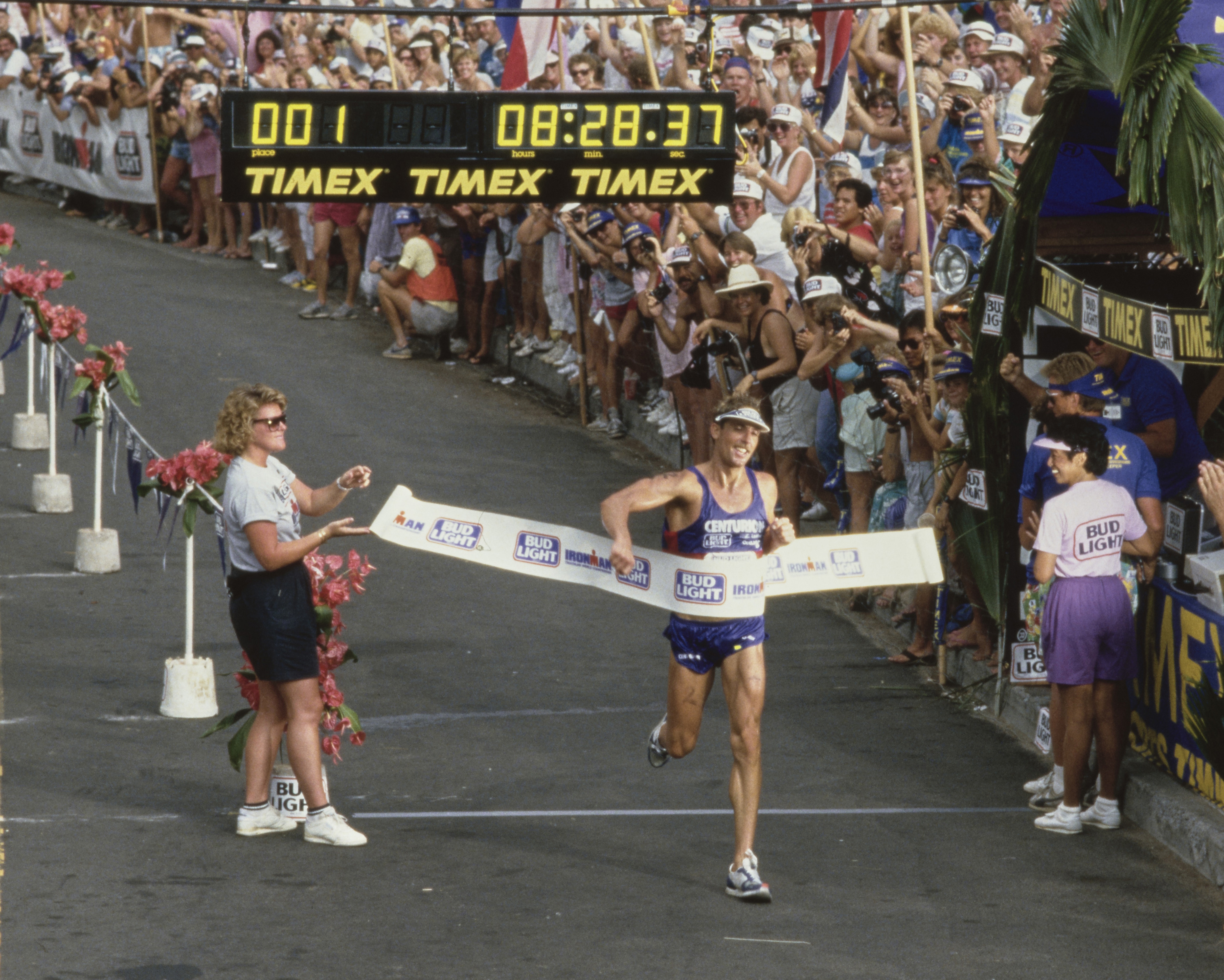
Six-time Ironman World Champion, coach, guru, inspiration, influence, innovator, statesman, Iron War protagonist… Dave Scott has been a towering presence in triathlon since the dawn of the sport. His rip-roaring Kona victories and epic battles with Mark Allen have all have gone down in triathlon folklore. Quite simply, he’s our number one all-time Kona great.
Born on 4 January 1954, Dave Scott grew up in California with a relentless thirst for sport. Scott’s first triathlon was in 1976, when came second at the Turkey Triathlon in San Francisco.
His Ironman World Championship journey began in 1978 when Ironman creator John Collins handed him a flyer for the second ever Hawaii race after he finished ninth at the Waikiki Roughwater Swim.
His interest was ignited but it wasn’t until Barry McDermott’s famous account of the 1979 race in Sports Illustrated that made him vow to return to Hawaii for the 1980 race.
And he did, and obliterated the competition, winning by over an hour and becoming the first man to go under 10 hours (9:24:33). The Man nickname was born.
After missing the race in 1981 he went on to be unbeaten at Hawaii until 1989 (though he boycotted the 1985 event due to the lack of a prize purse and missed 1988’s through injury).
The 1989 race proved to be one of the mosr memorable the sport has ever known. 35-year-old Scott produced a 2:41hr marathon on the way to smashing his course record by 18mins with a time of 8:10:13.
Unfortunately for him, though, Allen – five years his junior – had matched him every stroke, pedal and stride for 223km before breaking free with 3km to go to win his first Kona title at the eighth time of asking.
But, looking back, Scott says, “Coming across the line, I thought, ‘Damn, ‘I hate to lose this one’. In retrospect, it was a stellar day for both of us. Over the years, the numbers that we did have stood the test of time. And if we had the faster equipment the athletes have today, we would’ve gone helluva lot faster.”
Scott’s grip on the Ironman Hawaii title may have ended on that unforgettable day, now known as the Iron War, but his legacy lives on.
In 1994, a then 40-year-old Scott came out of retirement to take second place. Scott stopped the clock at an amazing 8:24:32, only four minutes shy of winner Greg Welch.
Since he retired from elite racing, Scott has become an elite coach (his athletes have included Chrissie Wellington, Rachel Joyce, Eneko Llanos and his son Drew, a rising American star of Ironman), a motivational speaker, a certifier of coaches, commentator and all-round inspiration.
220 said: In our opinion, Dave Scott has to rank as the greatest Ironman Hawaii triathlete of all time, because he almost single-handedly brought Ironman into a competitive era.
Before he raced the 1980 Ironman Hawaii the course record was over 11 hours, and competitors had to race with medics and support crews on hand because they were unsure if completion was even possible.
Scott completed the 1980 Ironman in 9hrs 24mins, and in doing so not only destroyed the rest of the field but actually proved the distance could be ‘raced’ over as opposed to just being completed.
By the time Scott had won his sixth title in 1987, his course record stood at 8:28hrs, and he finished the 1989 race under a minute behind Mark Allen in 8:10hrs.
If you consider the equipment Scott was using and the relatively small pool of pro long-course athletes to challenge him at the time, his achievements are phenomenal.
The times Scott was achieving in Kona are rarely bettered today, and were only matched by Mark Allen and Scott Tinley when he was at his peak.
All this along with his longevity (he finished 5th at Kona in 1996 aged 42) makes him fully deserving of the title ‘Greatest Kona Triathlete of all Time’.
Dave Scott’s Kona Highlights
- 6 x Ironman World Champion – 1980, 1982 (Oct), 1983, 1984, 1986, 1987
- 2nd, Ironman World Championship – 1982 (Feb), 1989, 1994
Much of this copy comes from Triathlon! written by former 220 features editor, Matt Baird.





